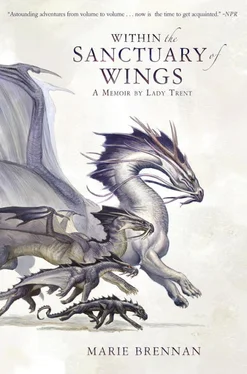Suhail had made no secret of his reluctance to let me go, but he understood the need, and he was smiling as we cleaned out the bowls that had held our supper. I should not have had any appetite, but after a long winter of limited rations, my body had little concern for the distress of my mind. (In particular, the tins of lime juice from Dorson’s supplies were exceedingly welcome. I had nearly forgotten what it felt like to have my teeth sit secure instead of loose.)
“How can you be so cheerful?” I demanded of him. Despite my words, a little smile of my own kept tugging at the corners of my mouth.
“I am just thinking,” he said, “that most people will not have heard yet that you are alive. What a grand entrance you will make!”
This was so at odds with my own mood that could only stare at him. Then he came and enfolded me in his arms; and to my surprise, I found myself laughing. “Indeed,” I said at last. If the shoulder of his shirt was damp by the time I drew back, neither of us commented on it.
And that is all I shall say of that night.
* * *
So it was that in early Gelis, just days before my fortieth birthday, we crossed the wall of the Sanctuary—the far wall, on the western side. The mountains there were even more deserted than the western edge of Tser-nga, but soon shrank into foothills, which gave out onto the high plains of Khavtlai. The people there had been subject to Yelang for over a century, but the Taisên presence was minimal: the imperial soldiers were content to hunker down in forts, leaving the trackless grasslands to the nomadic herdsmen of the region.
We could avoid the Taisên, but not the Khavtlek, who are as adept as Akhian nomads at knowing who passes through the vast empty spaces of their home. Fortunately for us, they had no particular fondness for their overlords, and could be persuaded to turn a blind eye to our passage. We had only to keep our Draconean companions hidden—for as much as we wanted their presence to make a stir, we did not want it to do so yet .
I should have foreseen our first difficulty. But after so many months cooped up in the frigid heights of the Mrtyahaima, the prospect of leaving them was, to me, an unmitigated joy. It did not occur to me, until our first night in Khavtlek territory, that not everyone in our party would view it the same way.
That the Draconeans had been silent during that day’s travels, I attributed to the necessity of bundling them under cloaks for concealment. But they dove into their tent with such alacrity, I knew something was amiss. “May I come in?” I called from outside the flap, and entered when I heard Kahhe’s reply.
They sat in a ring, facing inward with their wings partly spread to cup one another’s backs. For them it is a comforting gesture, akin to an arm around a human’s shoulders. “Is everything all right?” I asked. Then I waved the question away as foolish. “Is there anything I can do to help?”
“Make the sky smaller,” Zam muttered, hunching her back.
What felt to me like gloriously open terrain was, to them, a daunting void. With each day we travelled, their beloved mountains receded farther into the distance, replaced by arid grassland and empty sky, as alien to them as a subterranean city would be to me. At home they were accustomed to gliding down the valleys from higher precipices; here they could scarcely fly at all, even if we dared risk such a display. The cloaks were both a blessing and a curse, helping them close out the sight of so much open space, but causing them to feel even more penned in than I had felt in their house.
It pained me that there was nothing I could do for them. The only solution would be to send them home again—and that was no solution at all. We needed them with us, and their elders had decreed this was their punishment. The council had chosen well indeed. Only Atlim could return before this affair was done; and he refused, as he had refused to stay behind in the first place. The sisters had no choice but to endure.
Matters would become both better and worse once we reached a more settled area. Our destination was the city of Tiongau, in the lower-lying hills that marked the far boundary of the Khavtlai plain. This was a hotbed of Khiam Siu, though they had been left quite leaderless since the failed insurrection at Diéziò; and it was here, Giat Jip-hau said, that he intended to proclaim himself the first Khiam emperor.
I did not participate in the initial infiltration of the city. Not only had I no desire to do so, I would have been worse than useless: a Scirling woman in the middle of a Yelangese city would have been extremely noticeable. Along with my fellow countrymen and the Draconeans, I lay in wait outside the city—which you need not think meant we were all huddling under bushes. One of the local magnates with an estate in the nearby countryside was a secret Khiam sympathizer, and he gave us shelter while Giat Jip-hau and his chosen companions went disguised into Tiongau, in search of the rest of their coterie.
As little as I wished to participate in another battle, waiting there was excruciating. Dorson spent the entire time pacing; he greatly disliked sitting idle while the Yelangese went about their work. But of course the presence of Scirling soldiers in Tiongau, even out of uniform, would only increase the chance of discovery. I did not pace, but I fretted all the same, spinning a hundred different scenarios in which we had to flee east on sudden notice, back to the shelter of the Sanctuary.
But disaster did not come. As is so often the case with such things, the waiting was lengthy, but the event itself brief. I shall not attempt to relate what I was not there to see; I will only say that once the fighting began, it lasted for scarcely two days. Pockets of resistance remained, but the Khiam Siu had overthrown the governor and taken possession of key locations around the city. Once those were secure, Thu reappeared with a bandage around one arm, and announced that Giat Jip-hau required our presence in the city.
I was not at my best when Tom and I arrived at the governor’s palace. Although the arrival of the caeliger and the subsequent juggling of forces in the Sanctuary had done a little to acclimate me to human company once more, I was wildly unprepared for a city full of my own species. The last time I had faced them in such quantities was in Kotranagar a year before, on my way through Vidwatha to Tser-nga. I wondered how the Draconeans would fare, surrounded by humans. I was very glad that, for reasons of security, they would not enter Tiongau until they could do so under cover of darkness.
The prospective emperor had laid claim to the governor’s own chambers. Austere for reasons of both personal inclination and political image, Giat Jip-hau had ordered the rooms stripped of much of their finery; what remained, however, was still more than elegant, with laquered screens and windows framing views of the gardens outside. I felt terribly out of place, even after my first proper bath in more than a year.
He wasted no time in making it clear why he had summoned us. “The governor of this place, like many of his rank, kept a menagerie, and in it there are dragons. I know the Draconeans trained those creatures in the Sanctuary for their own use—the mews. I want them to train the dragons here.”
Tom and I exchanged glances. His minute shrug said he deferred to my knowledge on the matter. I almost wished he hadn’t; none of my instinctive responses were at all polite. I managed to replace them with a question: “Train them to what end?”
“You rode a sea-serpent into battle in the Keongan islands,” Giat Jip-hau said. “The dragons here are large enough to bear a rider.”
I fear I gaped like a landed fish. Too many words wanted to come out of my mouth at once; they clogged my mind instead, leaving me with nothing. Tom stepped into the breach. “My lord, that is more like riding a wild mustang than a war-horse. The Keongans use the serpents in part because they have neither the firearms nor the artillery of a modern army; you do not suffer any such lack. Dragons would not be of much use to you as a weapon.”
Читать дальше












